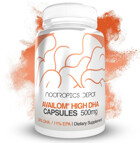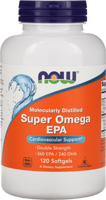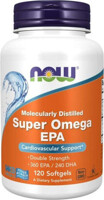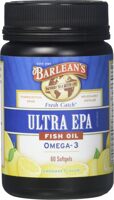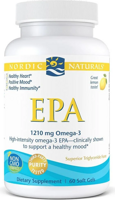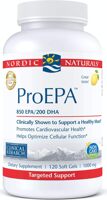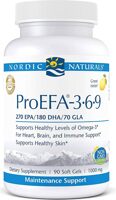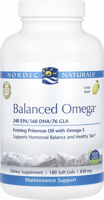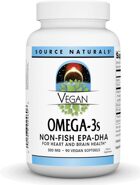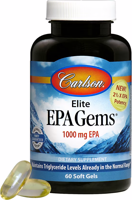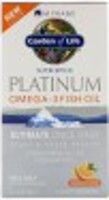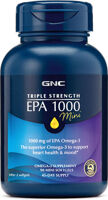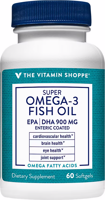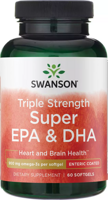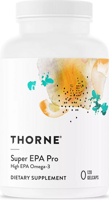EPA, short for eicosapentaenoic acid, is an important omega-3 fatty acid regularly found in fish oil. Alongside DHA, it makes for one of the most important markers when checking if a fish oil supplement is of good quality.
On this page, you can read about this crucial acid. The products listed here are those that are marketed as being high-EPA, but you will certainly find more products on the omega-3 listing.
As with DHA, many disorders are concomitant with below average EPA (eicosapentaenoic acid) levels in the bloodstream. Naturally, supplementation of EPA has shown to alleviate the symptoms and progression of many disorders, along with improving the health of average individuals. Let's look at some of the benefits of EPA supplementation:
Benefits of EPA supplementation
Cognition
In the adult brain, the main cognitive benefit from omega-3 supplementation can be linked to reducing neuroinflammation. EPA is the most effective at doing this.
Dementia
Multiple studies show that higher blood levels of EPA is associated with a reduced risk for dementia. Incorporating omega-3 into diet has been shown to improve symptoms of age related mental decline, particularly Alzheimer's disease. But the important detail is preemptive supplementation. There is no absolute cure for these diseases, so prophylaxis is the way to go. [1, 2]
Childhood development
EPA, in the form of fish oil, accelerates communication skills in infants.[3]
Depression
One meta-analysis showed that EPA, not DHA, was responsible for reducing depressive symptoms. Significant improvement in depressive symptoms (with or without anti-depressant medication) has been found with EPA-rich supplements.[4]
Heart health
Many variables, such as stress, diet, exercise, and genetics, have a massive effect on heart health. On a cellular level, one of the prime culprits for America's most deadly epidemic is arachidonic acid, or AA. This elusive omega-6 fatty acid is found in abundance in our diet (thank you corn!). But luckily, EPA can help to offset this anatomic insult. So how does EPA work its magic? First, we need to focus on evil AA.
Eicosanoids
These are fatty-acid based signaling molecules (prostaglandins, thromboxanes, leukotrienes, and others) that control many aspects of the immune system, central nervous system, and inflammatory responses. All eicosanoids produce an inflammatory response, but some inflame bodily tissue more than others. Since it would be impossible (and lethal) to squander the effect or production of all of these, we can say that reducing the production of more-inflammatory, and increasing the creation of less-inflammatory eicosanoids, results in an overall anti-inflammatory action.
EPA is an inhibitor of the enzyme delta-5-desaturase that produces AA. DHA, due to its molecular size, cannot inhibit this enzyme, which effectively squanders the body's creation of AA. And since AA creates the pro-inflammatory eicosanoids, EPA reduces inflammation.
Furthermore, EPA competes with AA for physpholipase A2, the enzyme that releases AA from membrane phospholipids, further reducing active levels of AA.
Lastly, similar to aspirin, EPA deactivates various prostaglandin-producing enzymes, such as COX and LOX.[5]
Thus, evidence suggests that a truly heart-healthy fish oil supplement should have a higher EPA to DHA ratio.
EPA and cognition
EPA, along with DHA, affects cognition through four known pathways: membrane fluidity, gene expression, synaptic function (neurons), and inflammation. Below is a detailed breakdown:
Membrane fluidity
Neuronal membranes are composed of a dynamic and continually altering lipid bilayer. Remember, for optimal neuron function, communication is key. In this case, we want membrane fluidity. When unsaturated fats compose the lipid bilayer, the cell becomes more permeable, allowing nutrients, oxygen, hormones, and many other molecules to more readily enter the cell. "Fatty acid composition of neuronal membranes can be directly altered by dietary modifications."[6]
Gene expression
For those unfamiliar with the subject of epigenetics, every experience we have, including our food intake, alters the expression of genes, which control the production of proteins -- and proteins control the composition of our bodies. In many ways, you truly are what you eat!
EPA is "known to mediate widespread effects on gene expression in the CNS" for the better by upregulating (increasing the production or activity) of retinoid pathways, which are "implicated in regulating synaptic plasticity and learning and memory."[6]
EPA enhances CREB1 transcription (involved in learning and memory through hippocampal long term potentiation, LPT.
Lastly, it has been shown to "directly downregulate inflammatory gene expression," thus reducing the creation of pro-inflammatory cytokines and enzymes such as COX-2 and iNOS. "Anti-inflammatory effects may counter inflammation-induced cognitive impairment in aging and neurodegenerative disorders."[6]
Synaptic function
The exact mechanism explaining why EPA improves the role of synapses in select parts of the brain is currently unknown, but research has shown that "quantitative changes in n-3 fatty acids in the body are often paralleled by quantitative changes of the monoamine concentration in the brain, in particular the frontal cortex, nucleus accumbens and the striatum, but also the hippocampus."[6]
Inflammation
This is the silent killer of cognition and EPA mitigates inflammation via direct action, as well through long term changes in gene expression, the details of which are described above.[6]
Recommended dosage
For the purpose of optimal health and cardiovascular maintenance, suggested daily consumption of DHA and EPA is at least .3% of total energy for a 2000-calorie diet. This is about 220mg per day of EPA. Many human studies use upwards of 200mg daily to no apparent ill effect.
An average serving of cold water oily fish contains anywhere from 200mg to 2000mg of omega-3 fatty acids, with approximately half being DHA. So there's little cause for concern with taking large quantities of EPA.[9, 10] According to the FDA, up to 3000mg of DHA/EPA per day from all sources (diet and supplements) is generally considered safe for most adults.[11]
As always, these statements have not been approved by the Food and Drug Administration, does not constitute medical advice, and you should always consult your doctor before beginning any new supplement, drug, or exercise regimen.
Dangers, side effects, interactions
Take caution if you consume blood-thinning medications such as aspirin or warfarin, as fish oil reduces blood clotting and could enhance the drugs' effects.
Fish, and subsequently fish oil (the main source of EPA), is susceptible to the accumulation of heavy metals and fat-soluble pollutants. Ensure that you are taking a quality supplement that indicates proper purification methods. As an alternative (though generally more expensive), newer omega-3 supplements produced from microalgae oil have a lower risk of pollutant exposure.[7]
Fish oil (the main source of EPA), is susceptible to the accumulation of heavy metals
EPA stacks
For cognitive enhancement, EPA will stack with anything. Many people claim that EPA (and DHA) synergizes by increasing the potency of nootropics.
For cardiovascular health, one very interesting stack is combining fish oil (containing EPA) with a low-dose aspirin regimen, which may possibly multiply the protective effects of either individual constituent. This stack relies on reducing pro-inflammatory prostaglandin synthesis with aspirin, and promoting the less-inflammatory synthesis with fish oil.
As little as 20mg to 30mg per day of aspirin is enough to inactivate every platelet in your body (though platelets can still be created on demand, such as after a cut). According to Dr. McDougall's Health & Medical Center, "Fish fats (oils) and aspirin, if used at all, should be thought of as second line treatment -- as is true with any medication."[8] Thus, you should consult your doctor before combining these possibly synergistic compounds.
References
DHA/EPA Omega-3 Institute; "Low Plasma Eicosapentaenoic Acid and Depressive Symptomatology are Independent Predictors of Dementia Risk;" https://www.dhaomega3.org, Retrieved July 1, 2013
Omega-3 Supplementation Benefits Age-related Cognitive Decline, https://www.dhaomega3.org, Retrieved July 1, 2013
Meldrum SJ, D'Vaz N, Simmer K, Dunstan JA, Hird K, Prescott SL. "Effects of high-dose fish oil supplementation during early infancy on neurodevelopment and language: A randomised controlled trial." British Journal of Nutrition, 2012 Oct 28;108(8):1443-54. doi: 10.1017/S0007114511006878. Epub 2012 Feb 21
"Martins, JG, "EPA but not DHA appears to be responsible for the efficacy of omega-3 long chain polyunsaturated fatty acid supplementation in depression: Evidence from a meta-analysis of randomized controlled trials." The Journal of the American College of Nutrition, 2009 Oct;28(5):525-42
Sears B. The Zone. Regan Books. New York, NY (1995)
"Cognitive enhancement by omega-3 fatty acids from child-hood to old age: Findings from animal and clinical studies," https://www.sciencedirect.com, Retrieved July 1, 2013
Doughman SD, Krupanidhi S, Sanjeevi CB., "Omega-3 fatty acids for nutrition and medicine: Considering microalgae oil as a vegetarian source of EPA and DHA. Curr Diabetes Rev. 2007 Aug;3(3):198-203, Retrieved July 1, 2013, https://pubmed.ncbi.nlm.nih.gov/18220672
Dr. McDougall's Health & Medical Center; "Heart Disease, Prevention, Aspirin and Fish Oil;" 2013
"Fish and Omega-3 Fatty Acid," https://www.heart.org/, Retrieved July 1, 2013
Simopoulos, A.P., et al. "Essentiality of recommended dietary intakes for omega-6 and omega-3 fatty acids," Ann. Nutr. Metab. 43: 127-30, 1999.
- Can You Overdose on DHA and EPA, https://www.dhaomega3.org/, Retrieved July 1, 2013
EPA News on PricePlow
-
Apr 04, 2025 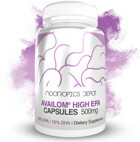
Product News
Nootropics Depot AvailOM High EPA was created.
Category: EPA -
Feb 22, 2025 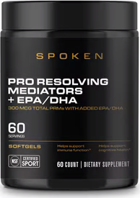
Product News
Spoken Nutrition Pro Resolving Mediators + EPA/DHA was created.
Categories: DHA, EPA -
Feb 22, 2025 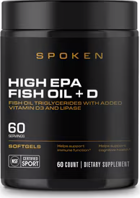
Product News
Spoken Nutrition High EPA Fish Oil + D was created.
Categories: EPA, Fish Oil, Vitamin D -
Feb 05, 2025 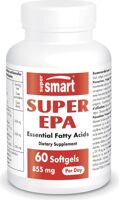
Product News
SuperSmart Super EPA was created.
Category: EPA -
Feb 04, 2025 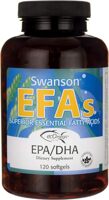
Product News
Swanson EFAs (EPA/DHA) was created.
Categories: DHA, EPA -
Feb 01, 2025 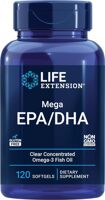
Product News
Life Extension Mega EPA/DHA was created.
Categories: DHA, EPA -
Dec 18, 2024 
Product News
Designs For Health OmegAvail Hi-Po has new variations: Categories: DHA, EPA -
Aug 08, 2024 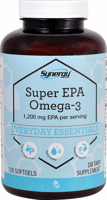
Product News
Vitacost Synergy - Super EPA Omega-3 was created.
Categories: EPA, Omega-3 -
May 08, 2024 
Product News
Designs For Health OmegAvail Hi-Po was created.
Categories: DHA, EPA -
May 03, 2024 
YouTube Video
Animal OMEGA Updated: Less Capsules, More DHA -
May 02, 2023 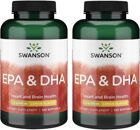
Product News
Swanson EPA & DHA was created.
Categories: DHA, EPA, Heart Health Supplements, Nootropics -
Apr 24, 2023 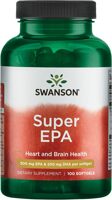
Product News
Swanson Super EPA was created.
Category: EPA -
Apr 07, 2022 
YouTube Video
MAKE OMEGAS ACTUALLY WORK | SmartPrime-Om by NutraShure (Dr. Hector Lopez)
Sign up for future EPA news!
Click the button below to sign up for future EPA news, deals, coupons, and reviews!
EPA Price Alerts
The following price alerts are still active:
- Mar 14, 2025Swanson EPA & DHA 120 Softgels dropped by 10.8% to $14.17 at Walmart
- Feb 27, 2025Spoken Nutrition High EPA Fish Oil + D 60 Softgels dropped by 7.7% to $59.99 at VitaCost.com
- Feb 22, 2025Swanson EFAs (EPA/DHA) 120 Softgels dropped by 6.3% to $14.89 at Amazon
- Feb 14, 2025Life Extension Mega EPA/DHA 120 Softgels dropped by 30% to $16.28 at Amazon
Sign up for future EPA deals and coupons!
Click the button below to sign up for future EPA deals, news, and coupons!
EPA Reviews & Videos
-
May 03, 2024Animal OMEGA Updated: Less Capsules, More DHA
-
Apr 07, 2022MAKE OMEGAS ACTUALLY WORK | SmartPrime-Om by NutraShure (Dr. Hector Lopez)
Subscribe for more EPA news and alerts!
Subscribe to PricePlow on YouTube, follow PricePlow on Instagram or click the button below to sign up for our latest EPA news and reviews!



